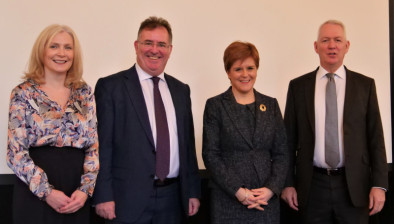Scotland’s revenues grow by £3 billion and deficit continues to fall
Scotland’s notional deficit is falling faster than the UK’s with onshore revenues increasing by 5.1% to reach £61.3 billion in 2018-19 as a result of continued economic growth, according to Government Expenditure and Revenue Scotland (GERS) figures published today.

Finance secretary Derek Mackay
The figures also highlighted that Scotland’s net fiscal balance has improved for the third year in a row.
Scotland benefited from a £3 billion increase in onshore revenues in the last year – the fastest growth since 2010-11 as the overall notional deficit fell by £1.1bn to 7.0% of GDP, down from 8%, in 2018-19. As revenues are growing at a faster rate than expenditure, this has caused a reduction in the notional deficit.
Finance secretary Derek Mackay said: “With record tax revenues, strong economic growth and near record-low unemployment, Scotland’s economy and public finances are strong. Today’s figures show overall revenue in Scotland reached £62.7 billion – exceeding £60 billion for the first time – reflecting the strength of our economy. Our notional deficit has fallen while public spending has increased thanks to our efforts to grow the onshore economy and the strong performance of taxes in Scotland. The Scottish Government’s choices on taxation are helping to create a more progressive tax system.”
He added: “This strong performance from Scotland’s economy is at risk as a result of the UK Government’s EU exit plans, and in particular a ‘no deal’ Brexit, which poses a severe threat to jobs, investment and living standards”. A ’no deal’ Brexit could reduce revenues in Scotland by around £2.5 billion a year, holding Scotland back and demonstrating why people in Scotland increasingly recognise the importance of making our own decisions.
“These figures reflect Scotland’s position as part of the UK. The Scottish Government believes we could unlock our full potential with independence, allowing us to take the best decisions for Scotland. As we have always said, Scotland has a strong and growing, economy and our future will be far brighter as an independent member of the EU.”
CBI Scotland director, Tracy Black, said: “That Scotland’s overall fiscal position has improved for the third year in a row is obviously welcome, as is the fact that onshore revenues have increased at the fastest pace since 2010-11.
“While things are moving in the right direction, there’s absolutely no room for complacency, particularly as Scotland still lags way behind the rest of the UK when you look at the deficit as a percentage of GDP.”
The figures have indeed revealed that including a share of North Sea revenue, Scotland experiences a deficit of £7.9 billion (4.4% of GDP). Excluding the Nort Sea revenue, Scotland experiences a deficit of £9.4 million (5.7% of GDP). Whereas for the UK, the budget balance saw a surplus of £18.1 billion, only 0.8% of GDP.
Ms Black added: “The inescapable fact is that Scotland spends more than it raises in taxation is a timely reminder of why a thriving and competitive private sector is essential for funding the kind of public services we all want to see.”








